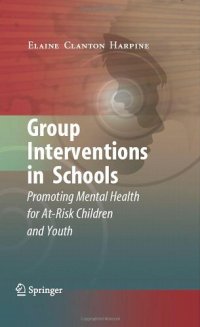
Ebook: Group Interventions in Schools: Promoting Mental Health for At-Risk Children and Youth
Author: Elaine Clanton Harpine (auth.)
- Genre: Mathematics // Symmetry and group
- Tags: Child and School Psychology, Education (general), Clinical Psychology, Psychotherapy and Counseling, Social Work
- Year: 2008
- Publisher: Springer US
- Edition: 1
- Language: English
- pdf
Children who are labeled at-risk often suffer from severe deficiencies in cognitive, affective, and behavioral skills that, if unaddressed, may lead to limited prospects for future success and well-being. Tapping into the therapeutic potential of groups, this volume presents the theory and practice of cognitive-oriented group-centered counseling – combining intrinsic motivation, efficacy retraining, and targeted play therapy and social role-playing – that can be implemented to help children build core social skills and emotional regulation to complement their classroom instruction.
In addition to providing a complete framework for developing, facilitating, and evaluating group interventions with children in their natural learning environments, Group Interventions in Schools:
- Offers observational exercises to assist readers in gaining a deeper understanding of how group interventions work.
- Provides both the theory and research that supports real-world group-based motivational interventions.
- Explains how and why group-centered interventions support children’s psychological adjustment and bolster their academic achievement.
- Analyzes how efficacy retraining works, specifically in changing the child’s cognitive and academic motivations and perceptions.
- Features instructive case examples and proven, ready-to-use group-focused interventions that can be readily applied or adapted to specific situations.
- Shows how therapeutic gains translate into improved classroom performance.
Written primarily for school-based psychologists, counselors, and other school mental health personnel, this volume provides a solid foundation for those new to the field as well as a creative boost for group specialists. Other education professionals and mental health clinicians working with children and adolescents will find much of practical value here. Its accessible style makes the book worthwhile as a training text.
Tapping into the therapeutic potential of groups, this volume presents the theory and practice of cognitive-oriented group-centered counseling – combining intrinsic motivation, efficacy retraining, and targeted play therapy and social role-playing – that can be implemented to help children build core social skills and emotional regulation to complement their classroom instruction. In addition to providing a complete framework for developing, facilitating, and evaluating group interventions with children in their natural learning environments, this book offers observational exercises to assist readers in gaining a deeper understanding of group interventions.